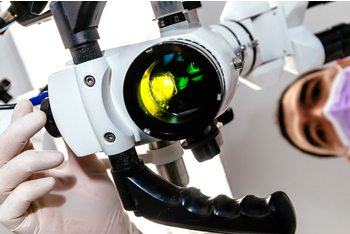Laser Dental Surgery

What is a Laser?
The word laser is an acronym that stands for Light Amplification by Stimulated Emission of Radiation. A laser is a beam of light so concentrated and focused that it can cut through metal and glass. Developed in 1960, lasers have applications in a wide variety of disciplines including communications, military, entertainment, and of course, medicine. In medicine and dentistry, lasers are used surgically to both stimulate cell proliferation and vaporize (or kill) cells, as well as many other things between those two extremes. The applications of lasers are virtually endless.
How do Lasers Perform Dental Surgery?
In dentistry, lasers perform various methods of surgery by cutting specific tissues, including gums (soft tissues) and hard tooth structure and bone (hard tissues). Different types of lasers emit this concentrated light beam at different wavelengths. The various tissues in the body absorb different wavelengths, giving certain lasers effectiveness in specific types of tissue. Because of this tissue specificity, it’s not a one-size-laser-fits-all-surgeries approach. Specific lasers are used for particular procedures.
When the body’s tissue absorbs laser energy, the temperature it reaches determines what happens to the tissue. The laser can stimulate cell proliferation, cause proteins to denature (break down), vaporize the tissue, or completely dehydrate and then burn the tissue. All of these things can happen with the same laser used in different ways. For this reason, only those practitioners with specialized training in laser surgery provide safe, accurate care with a dental laser.
What Kind of Dental Surgery are Lasers Used For?
Lasers have a wide variety of uses in dentistry, including everything from removing cavities from teeth to cutting away gum tissue. In our specialty practice, we use a laser geared toward the health of the hard and soft tissues around each tooth.
We use lasers to remove excessive or diseased gum tissue. We kill bacteria in deep gum pockets. Lasers can loosen hard tartar buildup, making it easier to remove from the root of a tooth. We also use lasers to stimulate regrowth of bone around a tooth where it was lost due to gum disease. Lasers can even help us save failing dental implants!
In our practice, we use lasers for periodontal (gum) surgery, treatment of peri-implantitis, preserving the jawbone in an area to receive a dental implant, and regeneration of bone and gum tissues. We also use lasers to cut away questionable tissues for biopsy (pathology evaluation) and improve the cosmetic appearance of “gummy” smiles.
What are the Benefits of Laser Use in Dental Surgery?
Lasers, like most technological advances in dentistry, provide many benefits to both the dentist and the patient. We choose to provide laser surgery because we believe it gives the best possible outcome for our patients.
Minimizes Bleeding
Because surgery involves cutting on tissue of the body, there’s always a risk for bleeding. By using a laser, we minimize the amount of bleeding that occurs. Laser energy promotes hemostasis (the stopping of the flow of blood). Our lasers do this by producing a coagulating, or clotting, effect. In many cases, our patients do not have any bleeding at all after leaving our office.
No Scalpel
In laser surgery, you do not go “under the knife” because there are no knives, scalpels or blades used at all. The laser itself, which looks like a small dental handpiece (but without the terrible drilling sound), does the cutting. This fact is very comforting to someone who suffers from dental anxiety and fear the idea of a sharp scalpel cutting the gums.
No Stitches
Because we do not cut open the gums during laser surgical procedures, there’s no need to stitch them back together. Stitches can be uncomfortable and irritating to the cheeks, lips and tongue. They also risk coming untied and needing replacement. Skipping the stitches is a definite benefit of laser surgery!
Less Inflammation
A smaller, more conservative surgical site leads to less inflammation. The laser energy itself also reduces the influx of inflammatory cells to the site of injury. Both medical and dental professionals often use lasers at low levels to reduce inflammation in joints and other areas of the body.
Less Post-op Pain
Less inflammation leads to less post-operative pain following a laser surgical procedure. Managing pain after surgery is what caused our nation’s current opioid crisis. By using lasers for surgery, we make the post-operative healing period far less painful. Patients can easily fight post-op discomfort from laser treatments with over-the-counter pain relievers like Tylenol or Advil.
Faster Healing
Every one of those benefits leads to this one. Smaller surgical sites with no scalpel cutting, no irritating stitches, and reduced postoperative inflammation allow the human body to heal much faster from a laser surgery. Because a laser creates less damage to the tissues, there’s less to heal. Laser energy also stimulates cell reproduction, which is something healing requires, so the laser itself promotes quicker healing.
Schedule Your Laser Periodontal Surgery Today
It’s vital to get treatment right away if you’re coping with dental issues that require laser surgery. Besides the risks of bone and tooth loss, one can experience severe gum recession and more significant health complications from lack of care, and best of all, there is no LANAP recovery time.
Rockland Dental Specialists offers LANAP laser surgery alongside their state-of-the-art dental care in the New City, NY area. Board-certified periodontist and implantologist Dr. Shalom Mintz is here to bring you the best laser gum surgery experience possible. He is passionate about helping patients resolve their gum disease and maintain their overall oral health. In addition, he is an instructor for the Institute for Advanced Laser Dentistry, teaching dentists in the use of the PerioLase MVP-7. Contact us today at (845) 809-0109 to speak with one of our team members about the periodontal services we offer or book an appointment online here.
CONTACT
VISIT
873 ROUTE 45 SUITE 201 NEW CITY, NY 10956
CORNER ROUTE 45 & NEW HEMPSTEAD ROAD
